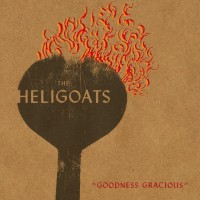I can't remember exactly when I discovered the great band Troubled Hubble and when they disbanded, but if memory serves me correctly, the two occurred about a week apart. As time passed and the band became one of my all-time favourites (with 2005's Making Beds In a Burning House being one of my most-listened-to discs of the past decade), it was only a matter of time before I started to track down the works of the band's former members.
Of the many bands to share members with Troubled Hubble, the Heligoats are perhaps the most similar, if only because they share Chris Otepka's distinct vocal style–Otepka sounds kind of like a cross between John K. Samson of the Weakerthans and Hutch Harris of the Thermals. Musically, the Heligoats are more rooted in folk and perhaps more experimental than Troubled Hubble ever were, as evidenced by the interesting arrangements on songs like "Rubber Stopper".
The Heligoats' previous release, The End of All Purpose EP, was perhaps too experimental, something that Goodness Gracious corrects out of the gate. The opener, "A Guide to the Outdoors" starts as a deceptively simple acoustic number before instruments pile in and it crescendos to a peak. Several tracks on here fly by with folk punk-type straightforwardness, such as "Fish Sticks" and "Heat Vents", while the more experimental songs are restrained in a way that keeps the listener's attention at all times. The album is also far catchier than the band's previous output, with tracks like "Florida Panther" (not about the hockey team, as best as I can tell) liable to get stuck in your head for days.
That's not to say that the band is playing it safe, as it retains the main quirks that made Troubled Hubble so enjoyable. It never gets stuck into one tempo, but provides an ample amount of ups and downs to provide variety. One of the highlights of the disc is Otepka's delightfully weird lyrics. His writing style is completely unique–he's a storyteller that uses clever wordplay and focuses on the absurd, singing songs about exploring heating vents or songs taken from the point of view of a person's ashes. But in the midst of these bizarre perspectives, he manages to keep the songs relatable, with lines like "you sang a song and then learned to sing and said that you missed the songs you sang before you learned anything," a line that likely resonates with Org readers who find themselves at shows yearning to hear a band's earlier, rougher material.
Though the disc could do without the eerie collection of wind chimes and other noises that make up the minute-long track "Aquifer", that's only a minor problem on an otherwise excellent disc. As mentioned earlier, the band has corrected the problems of their earlier material while still retaining a completely unique identity, resulting in an extremely satisfying listen.
